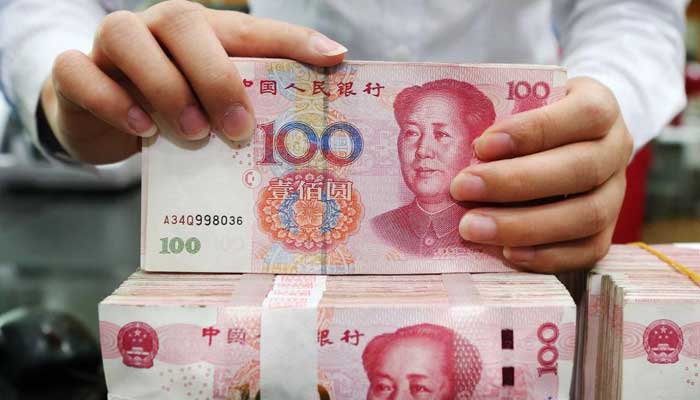Standard Chartered allowed to facilitate Yuan clearing, settlement
Two Chinese banks were earlier allowed such facility SBP and China increased the currency swap arrangement amount to CNY20 billion SCB can also provide CNY liquidity to the interbank market for the settlement of CNY based transactions
KARACHI: The central bank on Tuesday allowed Standard Chartered Bank (SCB) Pakistan to set up Yuan clearing and settlement mechanism in the country to improve trade transactions in the Chinese currency with its third biggest trading partner.
The State Bank of Pakistan (SBP) allowed Standard Chartered Bank (SCB) Pakistan Limited to establish their Yuan clearing and settlement setup in Pakistan.
“The expansion of local CNY (Chinese Yuan) clearing and settlement setup in Pakistan is expected to further improve efficiency of the local banking system in transacting in CNY, enhance market liquidity and facilitate rising trade and investment with China through fostering competition and increasing CNY resource avenues,” the SBP said in a statement.
Earlier, SBP permitted Industrial and Commercial Bank of China Limited Pakistan in 2015 and Bank of China Limited Pakistan in 2018 to establish similar local Yuan clearing and settlement mechanism in Pakistan.
SBP and China increased the currency swap arrangement amount to CNY20 billion from CNY10 billion and to Rs351 billion from Rs165 billion till May last year. A currency swap agreement between the two countries was signed in 2011. The swap arrangement got operational in 2013 and was extended for three years last year.
China is Pakistan’s third biggest trading partner after the US and the UK. Pakistan’s bilateral trade deficit with China widened to $12 billion in the fiscal year of 2016/17 from $4 billion in 2012/13. Pakistan's imports from China jumped to $14.13 billion in FY2017 from $12.11 billion in the preceding fiscal year, while its exports stood at $1.5 billion compared with $1.7 billion.
Economists said the implementation of trade in Yuan would ease burden on foreign exchange reserves that stood at $14.965 billion. Widening trade deficit has been the primary cause of yawning current account deficit that reached $12 billion in the last fiscal year.
Together with revenue-expenditures gap, current account deficit poses downside risks to Pakistan’s economy. The country’s growth is projected to slow down to a little over four percent during the current fiscal year compared with the decade high of 5.8 percent last year because of economic imbalances.
The SBP said SCB Pakistan can now open Yuan accounts of the banks operating in Pakistan to facilitate settlement of Yuan-based transactions, such as remittance to/from China. “SCB can also provide CNY liquidity to the interbank market for the settlement of CNY based transactions.”
Permission to SCB to clear Yuan trades is part of the central bank’s drive to expand local currency clearing and settlement mechanism in Pakistan.
SCB is the oldest and largest international bank in Pakistan. The bank opened its first branch in the country in March 1863. The bank currently has a network of 77 branches in 11 cities and employs more than 3,400 people in Pakistan, according to the bank’s website.
The SBP aims at facilitating the investments under the $60 billion China-Pakistan Economic Corridor — a flagship of Beijing’s Belt and Road initiative to build a new Silk Road of land and trade routes across Asia, Europe and Africa.
SBP said it has been at the forefront in providing conducive policy and regulatory environment to encourage the use of local currencies in trade and financing transactions between China and Pakistan.
Pakistan plans to lean towards Chinese financial markets in external financing to ease balance of payments difficulties. In December last year, the government approved launching of Panda Bond in Chinese-denominated Yuan currency with possible transaction size equivalent to $500 million in two different tranches in order to finance its yawning trade deficit with Beijing.
-
 New Guest Host Announced For The Kelly Clarkson Show
New Guest Host Announced For The Kelly Clarkson Show -
 Why Prince William’s Statement Over Jeffrey Epstein ‘says A Lot’
Why Prince William’s Statement Over Jeffrey Epstein ‘says A Lot’ -
 Paul McCrane Reveals Why Playing Jerks Became His Calling Card
Paul McCrane Reveals Why Playing Jerks Became His Calling Card -
 Prince William, Kate Middleton Thrashed For Their ‘bland’ Epstein Statement
Prince William, Kate Middleton Thrashed For Their ‘bland’ Epstein Statement -
 Bad Bunny Stunned Jennifer Grey So Much She Named Dog After Him
Bad Bunny Stunned Jennifer Grey So Much She Named Dog After Him -
 Kim Kardashian's Plans With Lewis Hamilton After Super Bowl Meet-up
Kim Kardashian's Plans With Lewis Hamilton After Super Bowl Meet-up -
 Prince William Traumatised By ‘bizarre Image’ Uncle Andrew Has Brought For Royals
Prince William Traumatised By ‘bizarre Image’ Uncle Andrew Has Brought For Royals -
 David Thewlis Gets Candid About Remus Lupin Fans In 'Harry Potter'
David Thewlis Gets Candid About Remus Lupin Fans In 'Harry Potter' -
 Cardi B And Stefon Diggs Spark Breakup Rumours After Super Bowl LX
Cardi B And Stefon Diggs Spark Breakup Rumours After Super Bowl LX -
 Alix Earle And Tom Brady’s Relationship Status Revealed After Cosy Super Bowl 2026 Outing
Alix Earle And Tom Brady’s Relationship Status Revealed After Cosy Super Bowl 2026 Outing -
 Why King Charles Has ‘no Choice’ Over Andrew Problem
Why King Charles Has ‘no Choice’ Over Andrew Problem -
 Shamed Andrew Wants ‘grand Coffin’ Despite Tainting Nation
Shamed Andrew Wants ‘grand Coffin’ Despite Tainting Nation -
 Keke Palmer Reveals How Motherhood Prepared Her For 'The Burbs' Role
Keke Palmer Reveals How Motherhood Prepared Her For 'The Burbs' Role -
 King Charles Charms Crowds During Lancashire Tour
King Charles Charms Crowds During Lancashire Tour -
 ‘Disgraced’ Andrew Still Has Power To Shake King Charles’ Reign: Expert
‘Disgraced’ Andrew Still Has Power To Shake King Charles’ Reign: Expert -
 Why Prince William Ground Breaking Saudi Tour Is Important
Why Prince William Ground Breaking Saudi Tour Is Important




